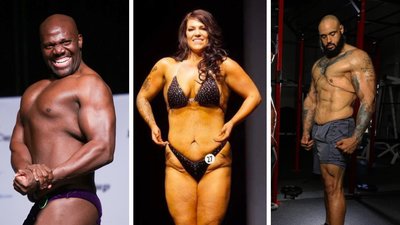Sitting in a quiet auditorium watching competitors file out on stage, you notice one participant who stands out. He has the suit, the tan, the technique—but he definitely doesn't look like everyone else. He's got a few stretch marks on his belly and not enough muscle to fill out the loose skin around his stomach or arms.
As a fan of bodybuilding, you admire anyone who has the guts to step on stage, but this guy has you baffled—why compete if you have no chance of winning? Then your neighbor leans over and whispers, "How embarrassing. That dude has no business being on stage."
This is a very touchy subject. And whatever your response to that competitor, you're not alone. The weight-loss transformation has become a fairly regular sight on the competitive stage in recent years, especially at local and regional shows, and one has been the subject of plenty of online discussion recently. Many believe that every competitor has a right to showcase his or her hard work, while others find it strange, or even offensive, to compete if you have no real chance of winning.
It's easy—perhaps too easy— to cast this conversation entirely in terms of winning and losing. After all, as I wrote in my article Three Question to Ask Yourself Before You Decide to Compete, the vast majority of bodybuilding competitors aren't there to finish in the middle of the pack—they're there to win. But clearly, that dialogue doesn't capture what's going on here.
So let's tackle the two tough questions: What brings the transformer to the stage, and do they belong there?
Inspiring Possibilities
There's no doubt that achieving lasting weight loss is incredibly difficult. Losing just 5 pounds is difficult for many, but losing 100 pounds or more? It often seems impossible. But, Louis Sheppard did just that.
When Louis first began his weight loss journey, which Bodybuilding.com chronicled in the video Give Yourself One Good Year, he didn't set out to inspire others. He was a 350-pound man trying to avoid the same fate as his childhood friend, who had passed away from obesity-related complications at age 37. Knowing he had to lose weight to save his life, Louis started working out at a gym where he met people who were training for competitions.
"I learned how to work out from people who were training to get onstage," explains Louis, "I just thought it was part of being fit."
Soon Louis found himself attending his first bodybuilding show to support and cheer for the friends who worked out alongside him.
As he recalls, "There was a guy up there who had just gone through his own transformation, and I thought to myself, 'What's the difference between him and me? I could do that.'"
Louis found new motivation in competition and developed a new purpose—to show people it is possible to lose 100 pounds in a year. True to form, one year later he'd lost 105 pounds and stepped onstage himself to compete.
Although there were moments when he dreamt of holding the trophy—who wouldn't?—Louis was ultimately realistic about his chances of winning.
"I know I didn't look like the guy standing next to me who has been doing this for 20 years," he says, two years later. "That's not the point. Where I started from and how I overcame it—that's the important thing."
For Louis, the show was an end point to a crucial part of his journey. For the sport of bodybuilding, it was a chance to inspire other people waiting to get the push they needed to change their lives. He showed them what is possible, and wore his results without shame in the bright lights.
Different Destinations, Same Journey
The harsh reality for a competitor who doesn't quite fit the classic bodybuilding aesthetic is they will, almost inevitably, cross paths with people who simply assume they don't belong. Recently, a female competitor named Jana Roller underwent a 140-pound weight loss before stepping onstage. She then set social media ablaze by calling out the photographer for deliberately omitting her photo from the competition's website. According to a FOX News story, the photographer said he contacted her privately and told her he didn't put them up because he figured she would be embarrassed and want them taken down.
As she explains in an Instagram post, she felt he did her an injustice because she'd earned the right to be there.
"I worked for 2 years, lost 140 lbs., went through prep just like everyone else," she wrote. "I stuck to the plan, did hours of cardio, 5 a.m. sessions. I worked just as hard to be told that I wasn't good enough to be showcased amongst everyone else."
Roller's explanation may or may not be "enough" for you, as a fan of bodybuilding. But, it highlights an important point: Yes, bodybuilding is a sport based on physical appearance, but, it's also an amateur athletic event, and athletes who compete have different end goals in mind. Some compete to take first, some train to do better than they did before, and some just want to prove that they can do it at all.
In this respect, it's no different than a golf tournament, obstacle course race, or Brazilian jiu-jitsu competition; if you pay your money, follow the rules, and do the work, you are entitled to your place on stage. You are, for that moment, a competitive athlete, and, ultimately, your reasons are your own.
So why was Roller up there? In a subsequent post, she laid it out clearly.
"I wanted to taste success," she wrote. "To taste the joy of reaching my goals. And, I am still hungry for more. That day I stepped onstage and accomplished the biggest goal I have ever set for myself was the best thing I have ever felt. It was exhilarating. You wanna know what that feeling was? Belief in myself."
As someone who has competed, coached, and judged bodybuilding shows, I can say that most competitors are fine with sharing the stage with weight-loss transformations. They get that Sheppard or Roller being onstage next to them can help grow the sport. They get that someone in the audience saying "I can do that" makes for more passionate fans and competitors. And, they flat-out admire the achievement, just like the rest of us.
Judges tend to get it, too. As former competitor and NGA head judge Jas Krdzalic explains, it is therapeutic for competitors who have lost a lot of weight to step onstage—and he applauds them for it.
"Bodybuilding doesn't require talent; it requires effort," says Krdzalic, who is also president of Vitalize, Bodybuilding.com's parent company. "As a judge, it is my job to place the person who best fits the criteria. But, if a person stands up there who doesn't fit but is happy with how their body looks, then that is their win."
Of course, in the case of weight-loss transformations, "their win" isn't a literal victory at the show. And, at one level, that could be viewed as a positive. Since these competitors are spared from having to aim for a literal victory against the field, they can focus on making the most of their individual achievements. But, in one high-profile bodybuilding federation, that's changing.
Should There Be a "Transformation" Category?
Better known to the Bodybuilding.com world as Possible Pat, the subject of an ongoing video series on our YouTube channel, Pat Brocco is no stranger to hard work. He underwent a dramatic transformation by losing over 340 pounds in the past three years, then, once he got closer to his ideal weight, Pat upped the ante and made the decision to compete in a bodybuilding show.
But, he didn't just choose the nearest local show. He chose to compete in an entirely new category created by World Beauty Fitness and Fashion (WBFF): the transformation division.
This competition, which will be at 17 WBFF shows around the world this year (it was also at a few in 2015 and 2016 under the title "Transformation/Makeover Division"), requires a competitor to share their written personal story, as well as a before picture, when they enter. But make no mistake: This isn't just about weight loss.
"It could also be for individuals overcoming anorexia/bulimia … cancer and other health disorders," reads the WBFF's page on the category. "This event is a true celebration of a personal journey to a more healthy lifestyle."
But, with that obvious upside comes a different type of difficulty. Brocco began his journey to the stage with the same goal as Sheppard and Roller: to inspire, and nothing else. But now, along with the rigors of prep, he faces a whole new slew of questions. What if he wins and goes to the world championships? What if he doesn't win? How will he handle either possibility?
We asked Pat those very questions on the Bodybuilding.com podcast, where he is an upcoming guest. And, after a pause, he answered it frankly.
"That's a good question. Damnit. If I don't win…life goes on. I won't do another show…it's not what I like. It's too much, it's intimidating," he said. "Yes, I'm doing a show to prove a point, but that point is not for everyone…I would've never thought in a million years I'd be stepping onstage. I want to show them it can be done, but then I want to go back to helping people."
I asked what he would say to individuals who have lost massive amounts of weight and are considering entering a bodybuilding competition.
"Do it," he replied, "if it's a goal that you have, and that goal drove you to be a better you, you have to finish it."
Reflecting on the emotional journey of his incredible weight loss, Pat described the transformation of his own self-image.
"At 600 pounds, people stare—you feel a lot of negativity—but 90 percent of it comes from yourself. You can't expect people to love you or to treat you better until you do it for yourself," he said. "That's what I learned—you have to love you first."
No matter how you feel about it, the weight-loss transformation has become a part of the sport. Don't expect it to change. But, expect to be amazed by what is possible.



